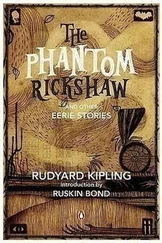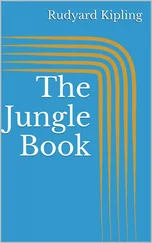"Yes, by Allahabad one lay still in the slack–water and let twenty go by to pick one; and, above all, the English were not cumbered with jewelry and nose–rings and anklets as my women are nowadays. To delight in ornaments is to end with a rope for necklace, as the saying is. All the muggers of all the rivers grew fat then, but it was my Fate to be fatter than them all. The news was that the English were being hunted into the rivers, and by the Right and Left of Gunga! we believed it was true. So far as I went south I believed it to be true; and I went down–stream beyond Monghyr and the tombs that look over the river."
"I know that place," said the Adjutant. "Since those days Monghyr is a lost city. Very few live there now."
"Thereafter I worked up–stream very slowly and lazily, and a little above Monghyr there came down a boatful of white–faces—alive! They were, as I remember, women, lying under a cloth spread over sticks, and crying aloud. There was never a gun fired at us the watchers of the fords in those days. All the guns were busy elsewhere. We could hear them day and night inland, coming and going as the wind shifted. I rose up full before the boat, because I had never seen white–faces alive, though I knew them well—otherwise. A naked white child kneeled by the side of the boat, and, stooping over, must needs try to trail his hands in the river. It is a pretty thing to see how a child loves running water. I had fed that day, but there was yet a little unfilled space within me. Still, it was for sport and not for food that I rose at the child's hands. They were so clear a mark that I did not even look when I closed; but they were so small that though my jaws rang true—I am sure of that—the child drew them up swiftly, unhurt. They must have passed between tooth and tooth—those small white hands. I should have caught him crosswise at the elbows; but, as I said, it was only for sport and desire to see new things that I rose at all. They cried out one after another in the boat, and presently I rose again to watch them. Their boat was too heavy to push over. They were only women, but he who trusts a woman will walk on duckweed in a pool, as the saying is: and by the Right and Left of Gunga, that is truth!"
"Once a woman gave me some dried skin from a fish," said the Jackal. "I had hoped to get her baby, but horse–food is better than the kick of a horse, as the saying is. What did thy woman do?"
"She fired at me with a short gun of a kind I have never seen before or since. Five times, one after another" (the Mugger must have met with an old–fashioned revolver); "and I stayed open–mouthed and gaping, my head in the smoke. Never did I see such a thing. Five times, as swiftly as I wave my tail—thus!"
The Jackal, who had been growing more and more interested in the story, had just time to leap back as the long tail swung by like a scythe.
"Not before the fifth shot," said the Mugger, as though he had never dreamed of stunning one of his listeners—"not before the fifth shot did I sink, and I rose in time to hear a boatman telling all those white women that I was most certainly dead. One bullet had gone under a neckplate of mine. I know not if it is there still, for the reason I cannot turn my head. Look and see, child. It will show that my tale is true."
"I?" said the Jackal. "Shall an eater of old shoes, a bone–cracker, presume to doubt the word of the Envy of the River? May my tail be bitten off by blind puppies if the shadow of such a thought has crossed my humble mind. The Protector of the Poor has condescended to inform me, his slave, that once in his life he has been wounded by a woman. That is sufficient, and I will tell the tale to all my children, asking for no proof."
"Over–much civility is sometimes no better than over–much discourtesy, for, as the saying is, one can choke a guest with curds. I do not desire that any children of thine should know that the Mugger of Mugger–Ghaut took his only wound from a woman. They will have much else to think of if they get their meat as miserably as does their father."
"It is forgotten long ago! It was never said! There never was a white woman! There was no boat! Nothing whatever happened at all."
The Jackal waved his brush to show how completely everything was wiped out of his memory, and sat down with an air.
"Indeed, very many things happened," said the Mugger, beaten in his second attempt that night to get the better of his friend. (Neither bore malice, however. Eat and be eaten was fair law along the river, and the Jackal came in for his share of plunder when the Mugger had finished a meal.) "I left that boat and went up–stream, and, when I had reached Arrah and the backwaters behind it, there were no more dead English. The river was empty for a while. Then came one or two dead, in red coats, not English, but of one kind all—Hindus and Purbeeahs—then five and six abreast, and at last, from Arrah to the North beyond Agra, it was as though whole villages had walked into the water. They came out of little creeks one after another, as the logs come down in the Rains. When the river rose they rose also in companies from the shoals they had rested upon; and the falling flood dragged them with it across the fields and through the jungle by the long hair. All night, too, going North, I heard the guns, and by day the shod feet of men crossing fords, and that noise which a heavy cart–wheel makes on sand under water; and every ripple brought more dead. At last even I was afraid, for I said: 'If this thing happen to men how shall the Mugger of Mugger–Ghaut escape?' There were boats, too, that came up behind me without sails, burning continually, as the cotton–boats sometimes burn, but never sinking."
"Ah!" said the Adjutant. "Boats like those come to Calcutta of the South. They are tall and black, they beat up the water behind them with a tail, and they—"
"Are thrice as big as my village. My boats were low and white; they beat up the water on either side of them, and were no larger than the boats of one who speaks truth should be. They made me very afraid, and I left water and went back to this my river, hiding by day and walking by night, when I could not find little streams to help me. I came to my village again, but I did not hope to see any of my people there. Yet they were plowing and sowing and reaping, and going to and fro in their fields, as quietly as their own cattle."
"Was there still good food in the river?" said the Jackal.
"More than I had any desire for. Even I—and I do not eat mud—even I was tired, and, as I remember, a little frightened of this constant coming down of the silent ones. I heard my people say in my village that all the English were dead; but those that came, face–down, with the current were not English, as my people saw. Then my people said that it was best to say nothing at all, but to pay the tax and plow the land. After a long time the river cleared, and those that came down it had been clearly drowned by the floods, as I could well see; and, though it was not so easy then to get food, I was heartily glad of it. A little killing here and there is no bad thing—but even the Mugger is sometimes satisfied, as the saying is."
"Marvelous! Most truly marvelous!" said the Jackal. "I am become fat through merely hearing about so much good eating. And afterward what, if it be permitted to ask, did the Protector of the Poor do?"
"I said to myself—and by the Right and Left of Gunga! I locked my jaws on that vow—I said I would never go roving any more. So I lived by the Ghaut, very close to my own people, and I watched over them year after year; and they loved me so much that they threw marigold wreaths at my head whenever they saw it lift. Yes, and my Fate has been very kind to me, and the river is good enough to respect my poor and infirm presence; only—"
Читать дальше












